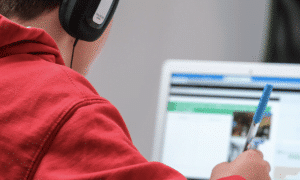
Here are 3 hacks to help you with learning more and making the most of video lectures.
In today’s world people are becoming more health-conscious, more isolated, and less sure of what the future holds.
Students and businesses are adjusting to remote learning and doing.
Virtual lectures are the new classroom.
Luckily, educators are evolving learning resources to help make these uncertain times more manageable.
Even with a global pandemic underway, the world doesn’t fully come to a halt. Academic institutions still need to churn out doctors and lawyers, and students still need to ace their exams.
Thankfully, new study methods are emerging from virtual platforms, helping students prepare for the tests that’ll determine their futures, like the Bar Exam. Learn more about how to prepare for the USMLE and other vital tests by following these top three hacks to optimize the remote-learning experience.
Making the Most of Video Lectures
As you might know, I created a range of video lectures on topics that will improve your life. (See all my video courses here!) These hacks below will help you get the most out of any video lecture- from those at schools – to those you sign up for personal development.
1. Record Your Lectures for Better Notes
Live, interactive lectures provide stimulating learning material, but it can be hard to take notes and stay actively engaged at the same time. Rigorous classes needed to qualify for highly professional jobs often involve a lot of material and course objectives.
Trying to listen and transcribe can leave you completely lost and way behind. Consider using a screen recorder to record each lesson to replay later. This way, you can be actively participating in the live lecture, absorbing the information as it’s presented.
When you screen-record your class, you won’t miss out on the interactive learning experience and you’ll be able to relive it again later. This will be extremely useful if you need to brush up on some of the information before an exam.
You can easily screen-record on your desktop to have the class fully captured in video and audio. Your phone probably has a voice-recording app as well, which you can use to capture the lecture audio.
By doing this, you can pull the material up whenever you find time to study, and you’ll feel confident knowing the information is accurate, straight from the source.
2. Stay Clear of Distractions.
It can be hard to stay focused in class when it’s taking place on a screen.
Your home offers plenty of distractions to keep you from studying, even when lessons are interesting and engaging. Attending school in person doesn’t include learning intrusions like dirty dishes, comfy couches, or pets begging to be played with, but remote-learning does.
Do yourself a favor and limit the distractions in your workspace so that you can remain fully attentive during your video lecture. Learning through digital channels isn’t ideal, but if you prepare your study space just right, it’ll better enable learning and deep focus.
If you’re self-motivated and determined, you already have some of the characteristics needed to succeed when learning remotely. Go the extra mile and reserve a study-conscious space to attend your video lectures.
3. Listen More Than Once
The great thing about remote-learning is that you can compile a data-bank of notes that lives on a cloud rather than in a messy drawer of your home office. Take the opportunity to digitally organize your notes and all of your recorded lectures. This will make study material easier to find later.
Recorded lectures are great for studying. Always listen to lectures more than once, which can be during your workout, while you drive or cook, and anytime you have an open set of ears. Repetition is proven to cement important knowledge, so immerse yourself in course material before any upcoming exam.
Repetitive review will help you better absorb the knowledge presented in each video lecture. Research has revealed that most people need to hear things a few times before truly registering the meaning.
Making Video Lectures Work in Remote-Learning
We may not be living our best lives right now, but at least we have time to dedicate to furthering our education and studying hard. We are certainly faced with fewer distractions during this pandemic, but that doesn’t mean things are easy. Adjusting is uncomfortable, and it takes time, but getting through this difficult period will only make you stronger.
Explore my Video Courses
Get practical, do-able video training to improve your life
=> Learn more here! <=
P.S. Before you zip off to your next Internet pit stop, check out these 2 game changers below - that could dramatically upscale your life.
1. Check Out My Book On Enjoying A Well-Lived Life: It’s called "Your To Die For Life: How to Maximize Joy and Minimize Regret Before Your Time Runs Out." Think of it as your life’s manual to cranking up the volume on joy, meaning, and connection. Learn more here.
2. Life Review Therapy - What if you could get a clear picture of where you are versus where you want to be, and find out exactly why you’re not there yet? That’s what Life Review Therapy is all about.. If you’re serious about transforming your life, let’s talk. Learn more HERE.
Think happier. Think calmer.
Think about subscribing for free weekly tools here.
No SPAM, ever! Read the Privacy Policy for more information.
One last step!
Please go to your inbox and click the confirmation link we just emailed you so you can start to get your free weekly NotSalmon Happiness Tools! Plus, you’ll immediately receive a chunklette of Karen’s bestselling Bounce Back Book!



